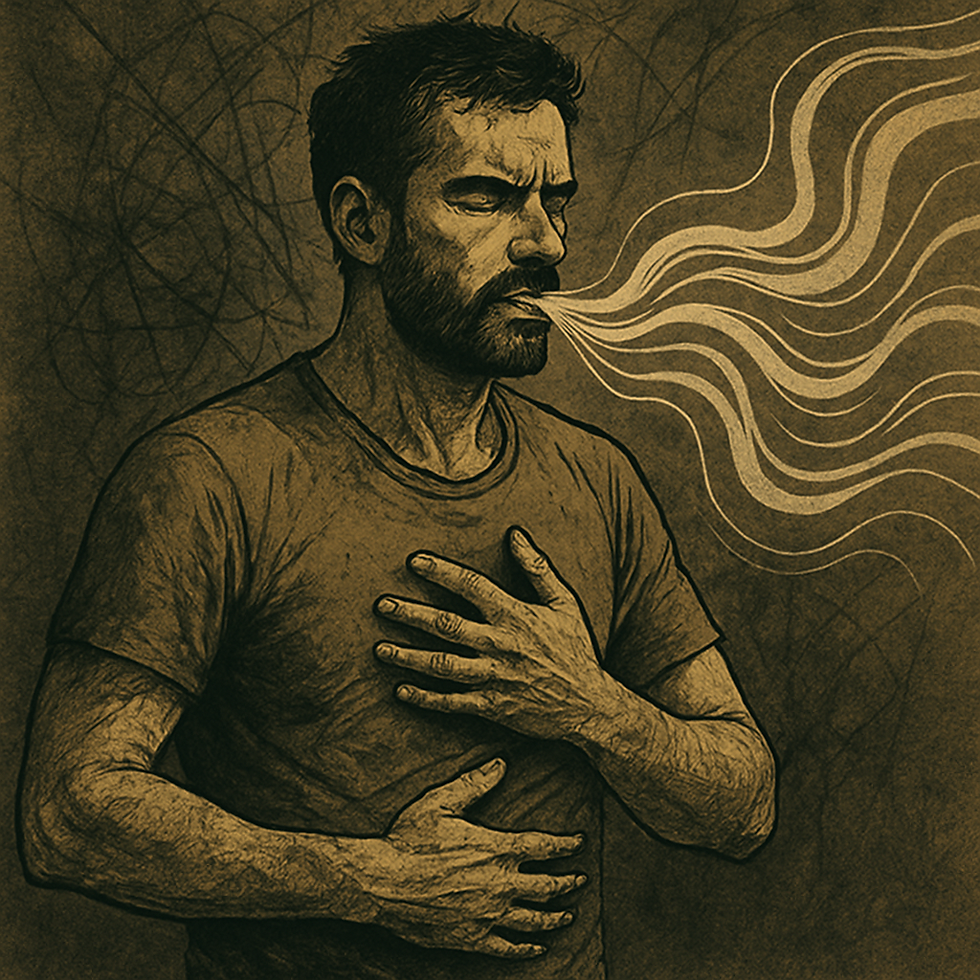Regulated Nervous System: Mastering the Power of Choice
- Matt Stewart

- Jul 1, 2024
- 7 min read
A regulated nervous system is like having a superpower—it gives you the ability to choose which state to tap into, whether it's the energetic drive of the sympathetic nervous system or the calming influence of the parasympathetic nervous system. Understanding how to regulate your nervous system can transform how you navigate life's challenges and recover from them.

What is Stress?
Stress is the body's response to any demand or challenge, creating pressure on the mind and body. It's important to understand that not all stress is bad. There are two main types of stress: eustress and distress.
Eustress vs. Distress
Eustress: This is the positive form of stress, often described as being nervously excited. Examples include starting a new job, engaging in a well-designed workout program, public speaking, or going on a first date. Eustress triggers a growth response from the body, increasing your window of tolerance for stress and helping you handle more of life's demands.
Distress: This is the negative form of stress, often overwhelming and debilitating. Examples include getting fired, participating in a poorly designed exercise program, or losing a relationship. Distress shrinks your window of tolerance, making everything feel like a burden or a crippling challenge.
Chronic vs. Acute Stress
Acute Stress: This is short-term stress that arises from specific events or situations. It’s temporary and often resolved quickly, such as the stress felt before a public presentation.
Chronic Stress: This is long-term stress that persists over an extended period, often due to ongoing pressures like a high-stress job or continuous financial worries. Chronic stress can lead to severe health problems over time.
The Sympathetic Nervous System: Fight or Flight
The sympathetic nervous system is responsible for the "fight or flight" response, preparing your body for physical and mental activity. When faced with a challenge, this system kicks in to help you navigate through it.
Hormones Involved:
Adrenaline: Increases heart rate, elevates blood pressure, and boosts energy supplies.
Cortisol: Increases glucose in the bloodstream, enhances the brain's use of glucose, and increases the availability of substances that repair tissues.
Physical Effects:
Central Nervous System: Heightened alertness, increased heart rate, and faster breathing.
Immune System: Short-term boost in immune function but can weaken with prolonged activation.
Musculoskeletal System: Muscles tense up, ready for action.
Mental and Emotional Effects:
Mental: Enhanced focus and heightened awareness.
Emotional: Feelings of anxiety and urgency.

Chronic Distress and Reactivity
When you remain in a state of chronic distress, your sympathetic nervous system stays on high alert. This constant state of arousal leads to a sense of anxiety and existential dread. I was in this state for most of my life due to unresolved trauma and my inability to regulate my own nervous system. I found myself running from one solution to another—drugs, relationships, jobs—searching for relief that never came.
Living in this heightened state, I was constantly angry and lashing out at everyone around me. My central nervous system perceived everything as a threat, leading to unconscious reactivity. I blamed the world for my problems, seeing myself as a victim. This pattern of reactivity continued until I learned to regulate my nervous system. Without this regulation, the sympathetic arousal kept me in a cycle of anxiety and existential dread.
The Parasympathetic Nervous System: Rest and Digest
The parasympathetic nervous system is responsible for the "rest and digest" response, helping you recover from the challenges and physical activities of daily life.
Hormones Involved:
Acetylcholine: Promotes calm and relaxation.
Serotonin: Stabilizes mood, feelings of well-being, and happiness.
Physical Effects:
Central Nervous System: Slowed heart rate, deeper and slower breathing.
Immune System: Restoration and strengthening of immune function.
Musculoskeletal System: Relaxation of muscles.
Mental and Emotional Effects:
Mental: Enhanced ability to think clearly and make decisions.
Emotional: Feelings of calm and relaxation.
Chronic Parasympathetic Arousal and Apathy
On the flip side, being stuck in a chronic state of parasympathetic arousal can lead to apathy and depression. Individuals may become too laid back, leading to people-pleasing and self-sacrifice. I thought that being more laid back would solve my chronic distress. However, this mindset caused me to go with the flow of life, allowing myself to be taken advantage of by friends and romantic partners. I ended up with a life I didn't like at all, losing my power of choice and feeling increasingly apathetic.

Homeostasis: The Body's Natural Equilibrium
Homeostasis is the body's natural state of equilibrium, much like the perfect porridge in the story of the three bears—neither too hot nor too cold, but just right. This balanced state allows you to choose effectively how to respond to different situations, whether it's gearing up for a challenge or winding down to recover.
Balancing the Nervous System
Achieving a balanced nervous system involves understanding and utilizing various techniques to ensure you can shift between states as needed. Here are some effective methods to help balance your nervous system:
Breathwork
Breathwork involves intentional breathing exercises to promote relaxation and reduce stress. Techniques like diaphragmatic breathing or alternate nostril breathing can activate the parasympathetic nervous system, helping you to calm down and find balance.
Progressive Muscle Relaxation
Progressive muscle relaxation (PMR) involves tensing and then slowly relaxing each muscle group in the body. This method helps reduce physical tension and mental stress, promoting a state of relaxation and balance.
Emotional Freedom Technique (EFT)
EFT, or tapping, involves gently tapping on specific points on the body while focusing on a particular issue or emotion. This technique can help release emotional blockages and reduce stress, contributing to a balanced nervous system.
Fascial Rebounding
Fascial rebounding, or rhythmic rocking and bouncing in place, helps to release tension stored in the fascial tissues of the body. By gently tuning back into the body's natural rhythms through this practice, you can stimulate the parasympathetic nervous system, reduce stress, and promote a sense of calm and relaxation. This technique can be especially helpful in reconnecting with your body and finding a balanced state.
Dietary Changes
A balanced diet rich in nutrients supports overall health, including nervous system function. Here are some dietary changes that can help balance your nervous system:
Increase Protein Intake: Consuming adequate protein can help stabilize blood sugar levels and provide a steady source of energy throughout the day. Incorporate high-quality protein sources such as lean meats, fish, eggs, beans, nuts, and seeds into your diet.
Decrease Processed Sugars: Reducing the intake of processed sugars can prevent spikes and crashes in blood sugar levels, which can contribute to mood swings and anxiety. Opt for natural sources of sweetness like fruits and avoid sugary snacks and beverages.
Limit Caffeine: While moderate caffeine consumption can be beneficial, excessive caffeine intake can lead to increased anxiety and disrupt sleep patterns. Try to limit caffeine consumption, especially in the afternoon and evening, and replace it with herbal teas or other non-caffeinated beverages.
Include Omega-3 Fatty Acids: Foods high in omega-3 fatty acids, such as salmon, flaxseeds, and walnuts, can help reduce inflammation and support brain health, promoting a balanced nervous system.
Magnesium Supplementation: Magnesium is crucial for nervous system health and can help reduce anxiety, improve sleep, and support muscle relaxation. Consider adding magnesium-rich foods like dark leafy greens, nuts, seeds, and whole grains to your diet, or talk to your healthcare provider about magnesium supplements.
Stay Hydrated: Proper hydration is crucial for overall health and can impact your mood and energy levels. Make sure to drink plenty of water throughout the day.

The Power of Choice
When our nervous system is regulated and balanced, we regain the power to choose how to act instead of simply reacting. In a balanced state, you can reflect and respond to situations thoughtfully rather than being driven by unconscious reactions.
Before I began working with my nervous system, I felt like I was chaotically bouncing from situation to situation, never feeling safe enough to pause and think through my decisions. I was constantly in a state of reactivity, driven by fear and anger. Every challenge felt like an attack, and my responses were often aggressive and unthinking.
By learning to regulate my nervous system, I discovered the ability to pause, reflect, and choose my responses. Instead of reacting with anger or fear, I could consider my options and respond in a way that aligned with my values and goals. This shift not only improved my relationships but also brought a sense of control and peace into my life.
This balance led me to create the business I had always dreamed of, to heal after a series of failed relationships, and to repair relationships with my family and friends. Working with the central nervous system is much like my first career as an electrician. The nervous system is a beautifully intricate electrical wiring diagram where positive and negative currents of electricity have been replaced with afferent and efferent neurons relaying information from the body to the brain.
Let me share a story about one of my clients. He needed help navigating the fallout of a breakup with a woman he thought was going to be his wife. He was disillusioned because he had attached so much of himself to this relationship. He struggled with anxiety and felt powerless to make any change in his life. After working together, he healed his familial wounds that led to that relationship, the codependency, and the lack of safety he felt. By working with his nervous system, he was able to feel safe in the present moment and realized that speaking up for himself was the only way to make the changes he needed to and begin to live the life he dreamt of. He has since moved across the country to the West Coast, where he met a wonderful woman and landed his dream job.

A dysregulated nervous system can wreak havoc on your life. To feel more alive, take back the power in your life, and create the future you deserve, you need to regulate your nervous system better. Release the stress and trauma. Restore your homeostasis. Reimagine your future. You are worth it.
Conclusion
Understanding and regulating your nervous system gives you the power to choose how to respond to life's demands. By recognizing the difference between eustress and distress, and balancing your sympathetic and parasympathetic responses, you can navigate challenges with confidence and recover with grace. Embrace the power of a regulated nervous system to transform reactivity into thoughtful action, reclaim your sense of control, and lead a life aligned with your true self.



Comments